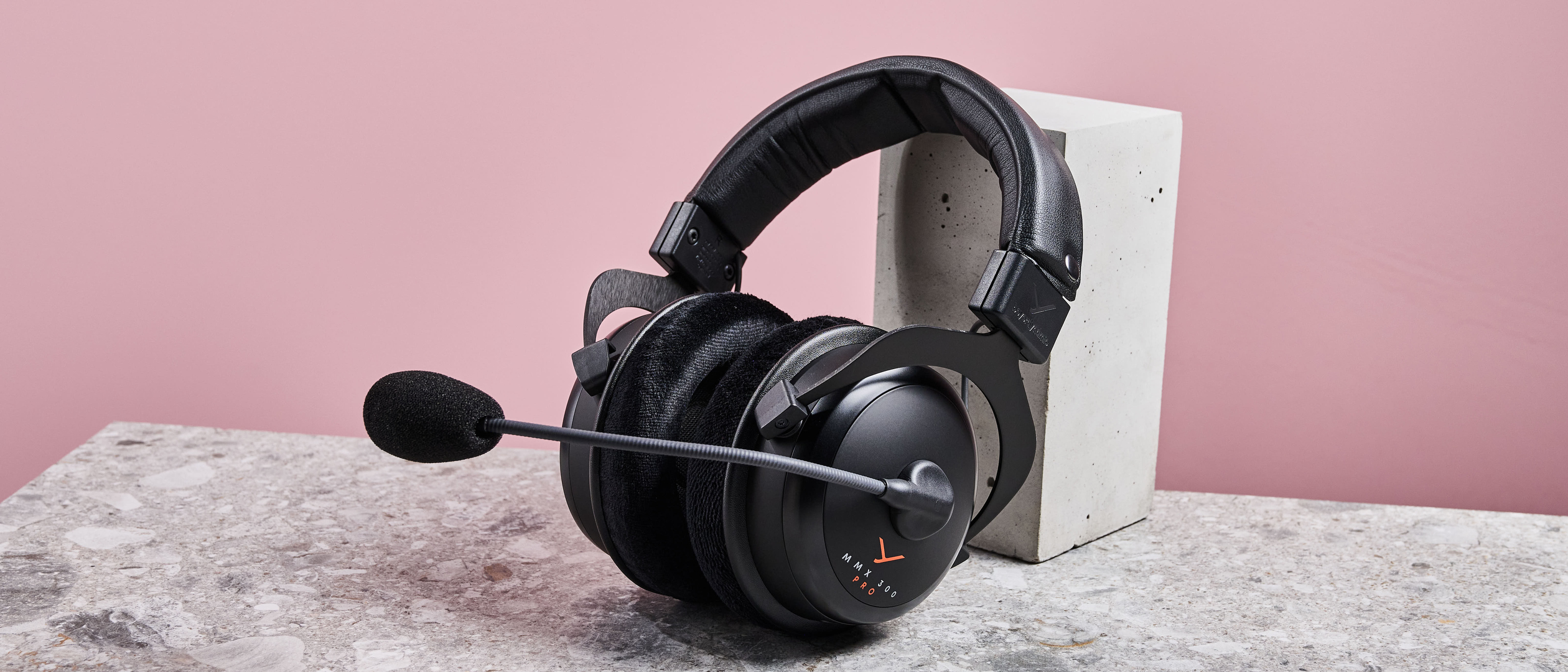TechRadar Verdict
The Beyerdynamic MMX 300 Pro keeps things simple, with a narrow focus on sound quality and comfort. In these departments, it certainly excels, but the lack of adjustments is a shame, especially given the asking price. If sound and microphone quality are of the utmost importance to you, then the Beyerdynamic MMX 300 Pro is a great pick, but if you want more from a gaming headset for less, there are plenty of alternatives to choose from.
Pros
- +
Excellent sound
- +
Great microphone
- +
Comfortable
Cons
- -
Wired only
- -
Lacking features
- -
Expensive for a wired headset
Why you can trust TechRadar
Beyerdynamic MMX 300 Pro: Two-minute review
The Beyerdynamic MMX 300 Pro hopes to distill the brand’s sonic pedigree into a gaming headset, by adopting a minimal design in every sense, devoid of extra features, and focusing completely on audio quality and comfort.
The appearance is certainly spartan. The total-black design is only offset by a few dashes of orange, but that’s about the only giveaway as to its intended gaming audience. Overall, I think it is a smart-looking headset that doesn't draw attention to itself.
This minimalism extends to its overall form, as the Beyerdynamic MMX 300 Pro cuts a rather slender profile, at least compared to some of the best wired gaming headsets. It also feels quite light, and the thick cable surprisingly doesn’t weigh it down.
The whole headset feels premium and engineered to a high standard, but as I’ve found with other Beyerdynamic headsets, the mechanism for adjusting the driver position feels clunky. Also, the strain reliefs on the cable fail to reassure me that they’ll prevent fraying over time.
As you would expect from Beyerdynamic, the MMX 300 Pro has excellent sound, with all frequencies coming through clearly. However, the bass is a little weak compared to headphones designed for music, so the headset wouldn’t be my go-to choice for audio playback alone. However, compared to other gaming headsets, it’s still among the best in this regard – it’s a shame, though, that there are no listening modes to choose from or EQ adjustments to make.
The microphone is well-made and very sturdy, yet the gooseneck design still allows for flexible adjustments. This makes getting it in the optimal position easy. While it doesn't detach or retract, it does fold out of the way quite well. The vocal quality is excellent, and it does a great job of blocking unwanted sounds coming through.
As for comfort, the Beyerdynamic MMX 300 Pro excels in this department too. Although the fit is tight, the ear cups and headband provide enough cushioning for extended use. However, the inside of the drivers did make slight contact with my ears, which can cause fatigue after a while – but this takes a very long time to manifest.
The connectivity and usability flaws found on the Beyerdynamic MMX 200 Wireless are non-existent here, with the Beyerdynamic MMX 300 Pro making for a slimmer, easier-to-use headset with arguably even better sound. However, given its hefty price tag, it’s hard to recommend it over other wired gaming headsets, as the competition is so fierce in this sector, making for better value alternatives than the Beyerdynamic MMX 300 Pro.
Case in point: the Razer BlackShark V2 Pro, which is the best wireless gaming headset in our view, is cheaper but still has great sound and packs in more features. Meanwhile, the Epos H3, our pick as the best wired headset, is considerably cheaper and performs brilliantly in most areas.
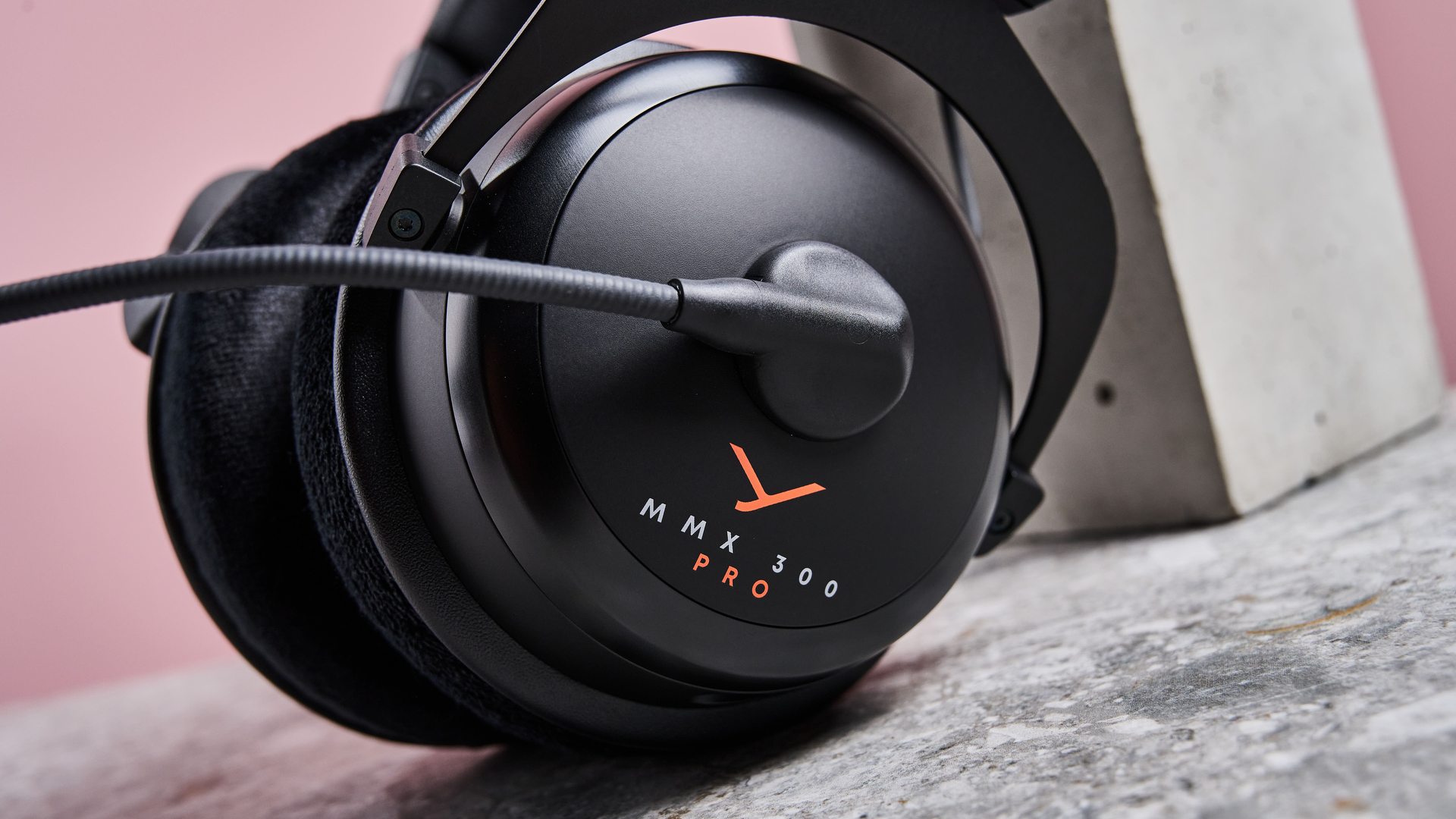
Beyerdynamic MMX 300 Pro review: Price and availability
- $299 / £259 / AU$499
- Available now
- Black only (unless customized)
The Beyerdynamic MMX 300 Pro costs $299 / £259 / AU$499 and comes in one stock color: black. If you order from the company’s website, you can customize the look of the Beyerdynamic MMX 300 Pro in a variety of ways, with intricate patterns and engraving options available.
Beyerdynamic’s wireless gaming headset, the MMX 200 Wireless, is considerably cheaper than the Beyerdynamic MMX 300 Pro, despite its multiple connectivity options and extra features. However, by keeping things simple with wired connectivity, the Beyerdynamic MMX 300 Pro avoids many of the pitfalls of the MMX 200 Wireless. It’s also less bulky and more comfortable, yet still offers Beyerdynamic’s trademark audio quality, albeit with less low-end impact than you might expect. Whether these advantages of the Beyerdynamic MMX 300 Pro justify the steep price increase, I’m not so sure – especially when you consider the lack of features.
For those looking for more out of a gaming headset, the Razer BlackShark V2 Pro could fit the bill: not only does it come with software to adjust various parameters, but it’s also wireless and cheaper than the Beyerdynamic MMX 300 Pro. And if you’re after one of the best PC gaming headsets specifically, then the SteelSeries Arctis Nova Pro Wireless is our top pick in this sector: although it’s considerably more expensive than the Beyerdynamic MMX 300 Pro, it does feature multiple connectivity options and a long battery life, in addition to great sound.
Beyerdynamic MMX 300 Pro review: Specs
| Price | $299 / £259 / AU$499 |
| Weight | 11.1oz / 314g |
| Compatibility | PlayStation 5, PlayStation 4, Nintendo Switch, Xbox Series X, Xbox Series S, Xbox One, PC, mobile |
| Connection type | Wired (2 x 3.5 mm mini stereo jack plugs & 1 x 3.5mm mini jack adapter for consoles) |
| Battery life | N/A |
| Features | In-line controls, detachable cable |
| Software | None |
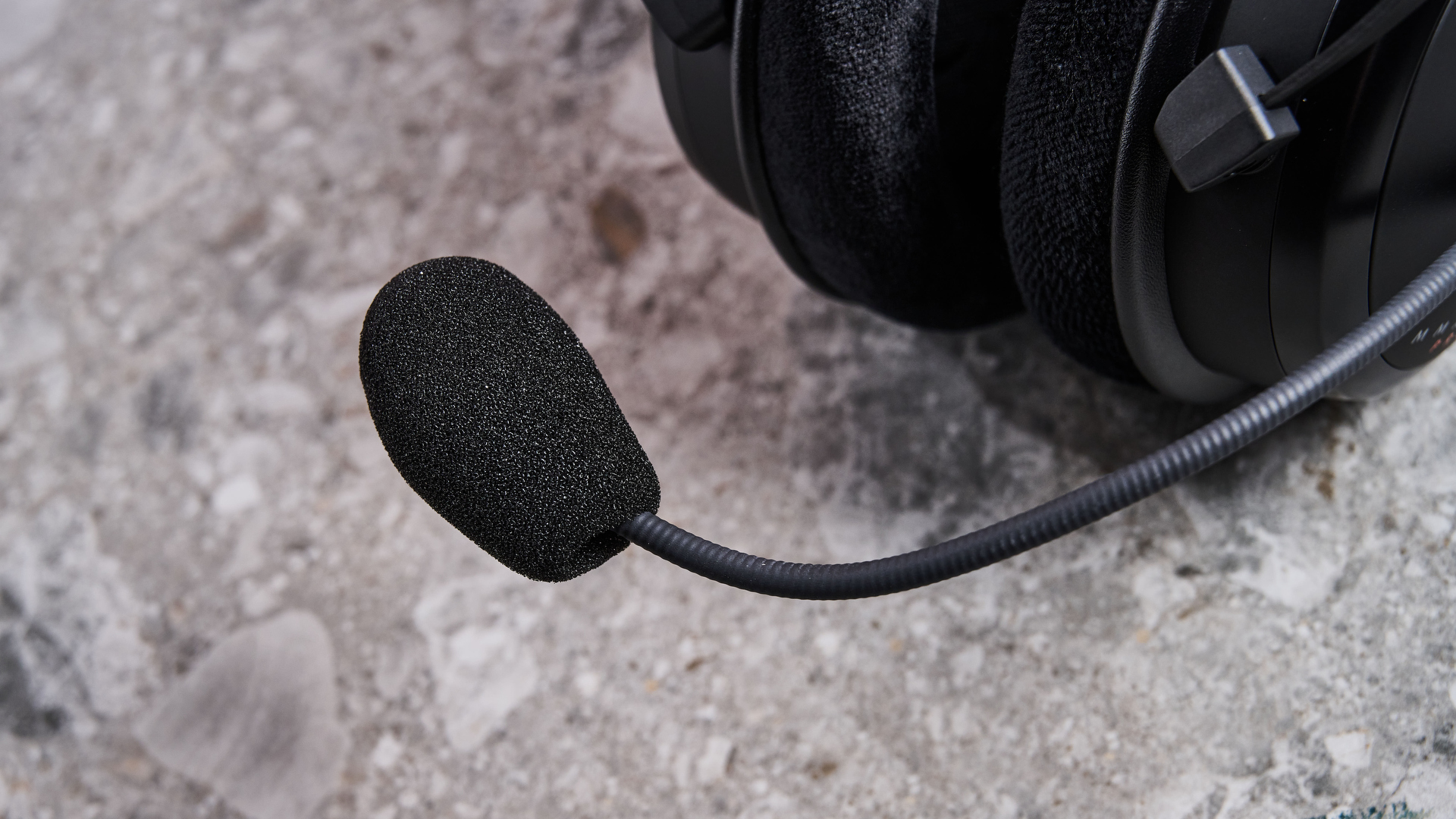
Beyerdynamic MMX 300 Pro review: Design and features
- Austere looks
- Thin, light and comfortable
- Lacking features
Much like Beyerdynamic’s other gaming headsets and headphones, the MMX 300 Pro cuts an understated figure. The black finish is enlivened slightly by some orange accents, but these are the only concessions to its gaming audience. Most aspects of the headset look and feel premium. The hard plastic shells of each driver have a smooth matte finish, while the headband and ear cups are plush yet durable.
The drivers are supported by heavy-duty metal hooks which again are solidly built. However, the mechanism used to adjust their position fails to match the same level of engineering, as it feels clunky to operate – an issue I’ve found with other Beyerdynamic headsets and headphones.
However, the form factor of the MMX 300 Pro represents an improvement over other Beyerdynamic models. It has a relatively slim profile, being less wide and unwieldy than the MMX 200 Wireless. The divers and ear pads are thinner, and the whole headset feels lighter too.
The Beyerdynamic MMX 300 Pro is also more comfortable to wear, offering plenty of cushioning around the ears and the headband. The materials used here feel durable, but both the headband and the ear pads are replaceable should they perish.
I’m usually not fond of circular driver designs, preferring an oval shape, but here, thanks to the lack of bulk, I had no trouble wearing them, even with glasses. Unlike the MMX 200 Wireless, the Beyerdynamic MMX 300 Pro didn’t get in the way when I leaned back in a chair or sofa. However, I did notice the inside of the drivers touching my ears slightly, which can cause aches after very long sessions exceeding two or three hours. They also don’t swivel, which means hanging them around your neck or storing them isn’t as easy as with other headsets.
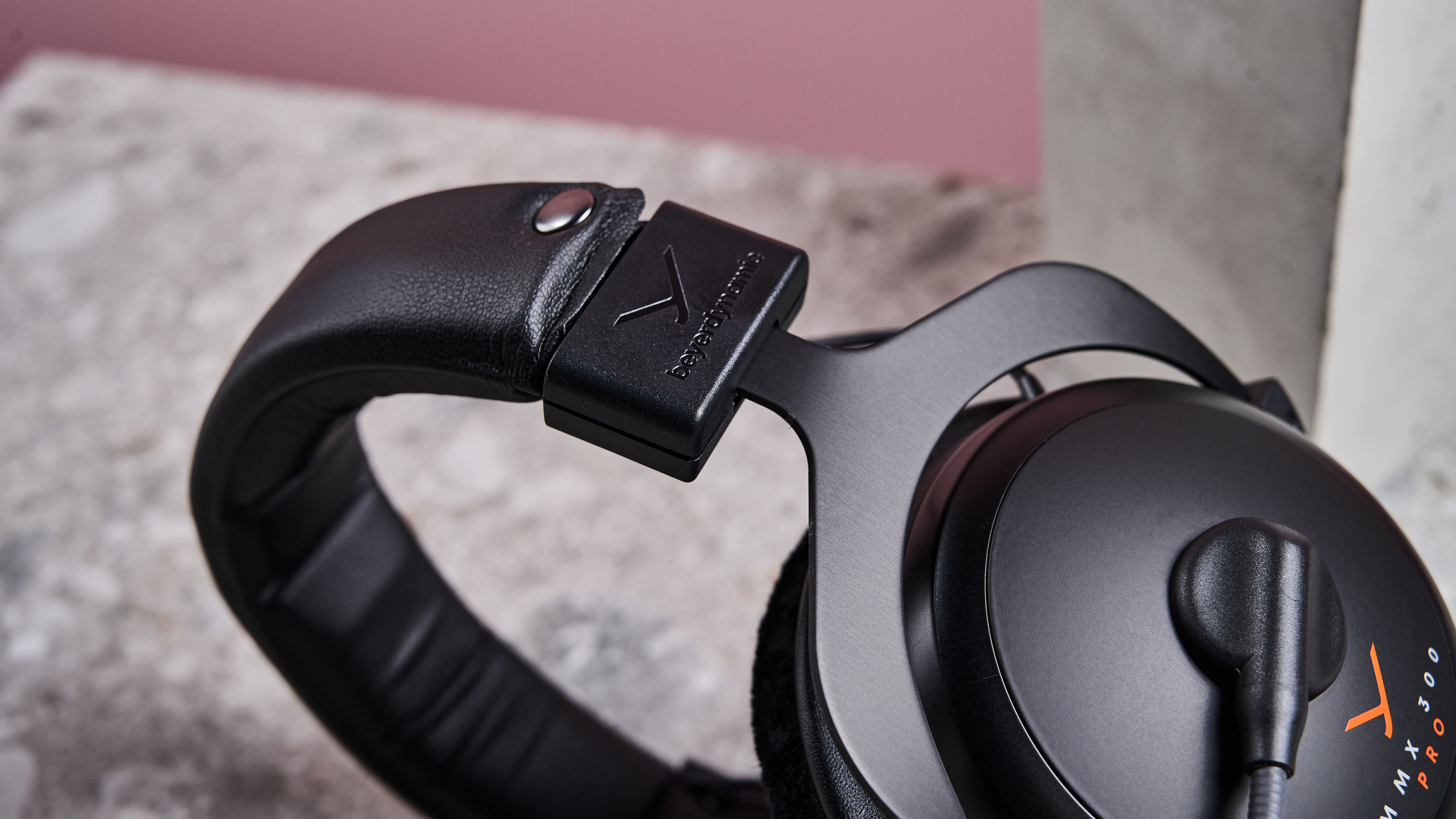
The analog cable is thick and strong, yet it doesn’t weigh down the headset; I could barely tell it was there, which is exactly what you want from a headphone cable. There’s some strain relief around the jacks, but these don’t seem to be the strongest, so I’m not completely confident they’ll prevent fraying in the long run. Another drawback is the rubber material on these reliefs, as it picks up dust and debris far too easily.
The jack secures tightly into the left driver, which is deeply recessed. However, it doesn’t offer an audible click when inserted, which can make it tricky to know if it’s inserted all the way. The instructions say to twist it slightly when inserting, but there is no feedback indicating how much this needs to be done, and it didn’t seem to make a difference whether I twisted it in or not.
The inline control module, which features output and input volume controls and a mute mic slider, is chunky but unobtrusive. The buttons and wheel feel premium here too and are easy to operate, although perhaps a touch too small for my liking.
The microphone on the Beyerdynamic MMX 300 Pro is similarly well-built. The swivel function is smooth yet sturdy, and the cloth tip cover is thicker than on some other gaming headsets, which bodes well for its longevity. The gooseneck is easily adjustable and stays in position once fixed, making for the perfect blend of flexibility and security.
One drawback of the mic, however, is that it still can’t be detached or folded away completely, although it can be rotated upwards to keep it out of the way. In contrast, the MMX 200 Wireless has a detachable mic, and the PlayStation Pulse Elite, one of the best PS5 headsets, has a retractable mic for an even more elegant solution.
In focusing on high-quality audio, the Beyerdynamic MMX 300 Pro appears to have sacrificed features. There are no options to adjust the sound, other than volume, either via buttons or software. For a wired headset at this price, you would expect more; even the cheaper MMX 200 Wireless has an Augmented Mode for ambient noise passthrough, but the Beyerdynamic MMX 300 Pro gets no such endowments.
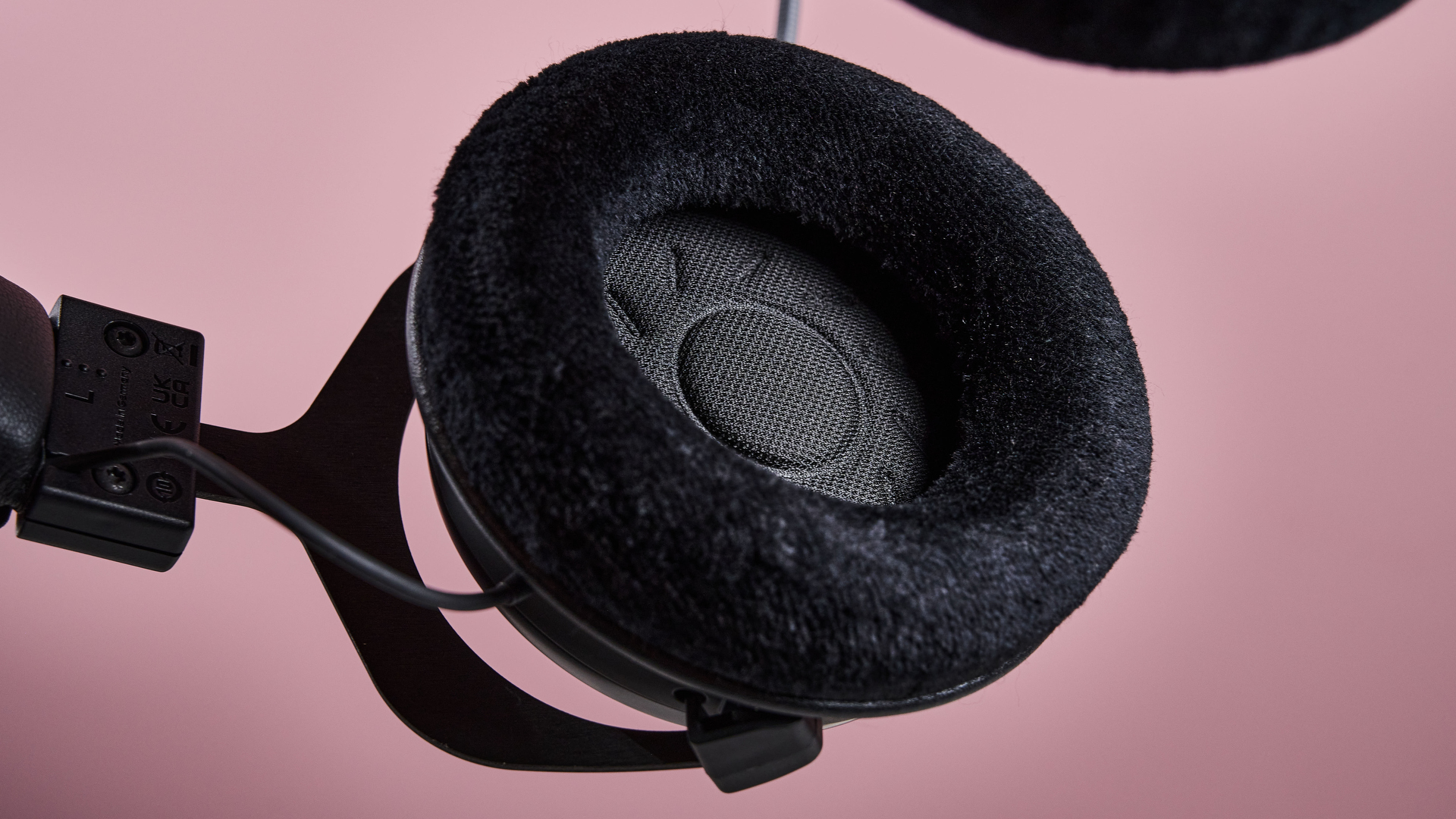
Beyerdynamic MMX 300 Pro: Performance
- Superb gaming audio
- Great mic clarity
- Low-end lacking slightly
The sound produced by the Beyerdynamic MMX 300 Pro is impressive. The STELLAR.45 drivers render all frequencies with clarity, especially the highs and upper mids. The closed-back design helps to improve the sense of space and immersion as well.
However, while there is some punch to the low end, it still lacks the depth of bass you would expect. This isn’t such a problem for gaming, but it’s more disappointing when listening to music. Other headsets feature different modes for different scenarios, but this isn’t an option with the Beyerdynamic MMX 300 Pro – you get what you are given.
The integrated microphone claims to maximize vocal clarity thanks to the high-quality condenser capsule, and during my tests, this did indeed prove to be the case. Voices come through with a high degree of fidelity, and unwanted noises, such as coughs and other plosive sounds, are all but eliminated.
However, as with the output of the Beyerdynamic MMX 300 Pro, there are no adjustments for the microphone, save for the standard volume controls. The closed-back design and natural noise isolation mean that you can barely hear your own voice, which some gamers, including myself, may find a little disconcerting, so the option to allow some sort of input monitoring would’ve been welcomed.
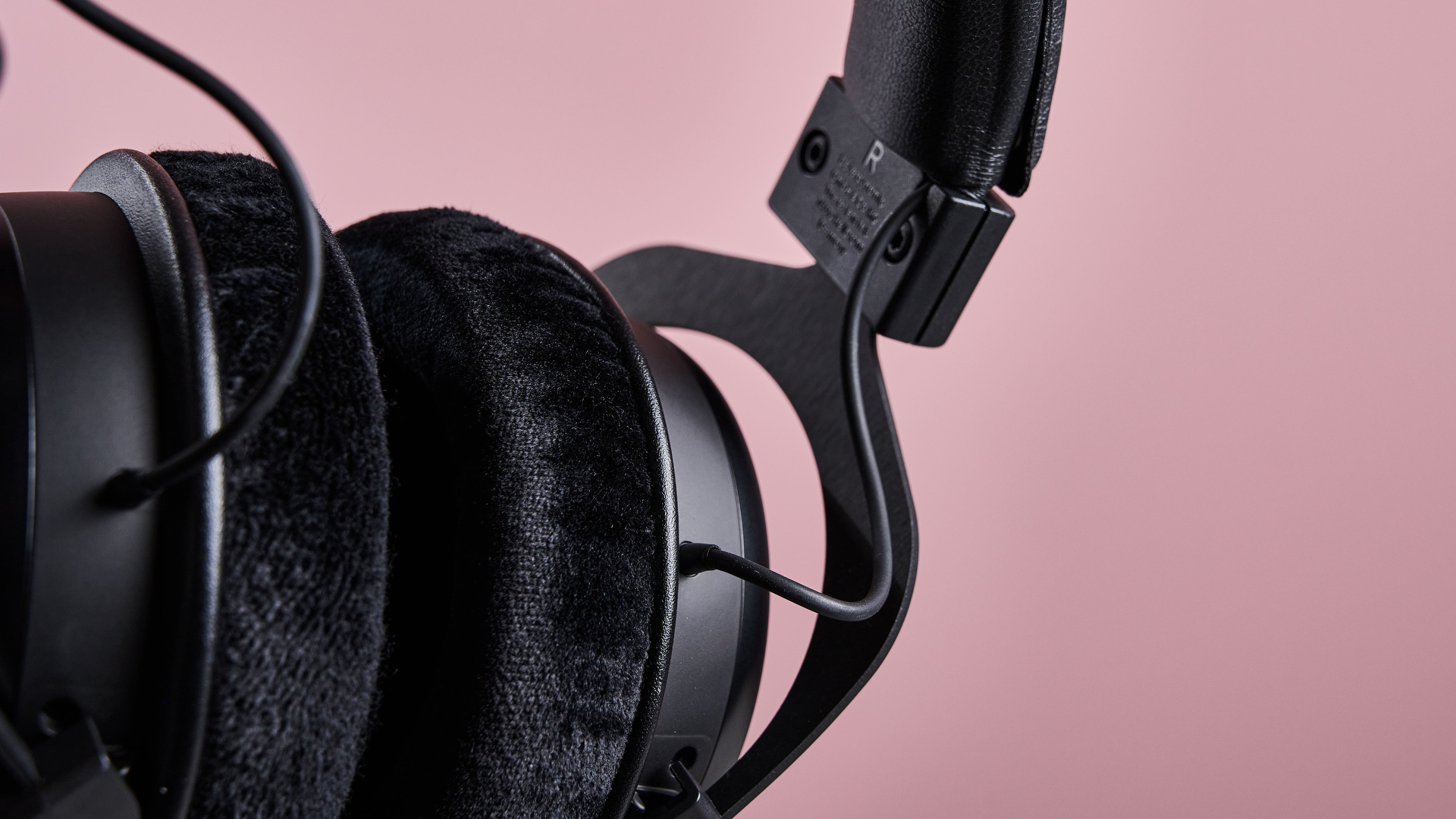
Should you buy the Beyerdynamic MMX 300 Pro?
Buy it if...
You want stellar gaming audio
There’s no denying the sound quality of the Beyerdynamic MMX 300 Pro, and although the bass may be a tad weak, it’s still excellent for a gaming headset.
You want something comfortable
The ear pads and headband provide hours of wearing comfort – only extremely long sessions will cause fatigue.
Don't buy it if...
You want to cut the cords
There’s only wired connectivity here, which, at this price, is a shame.
You want multiple features
There are no adjustments you can make to the sound, and no feature to allow you to hear your own voice through the mic.
You’re on a budget
For a wired gaming headset, the Beyerdynamic MMX 300 Pro sits right at the top end of the market. Whether the excellent sound quality alone is worth this much, I’m not sure.
Also consider...
| Row 0 - Cell 0 | Beyerdynamic MMX 300 Pro | Razer BlackShark V2 Pro | Epos H3 |
| Price | $299 / £259 / AU$499 | $199 / £199 / AU$349 | $119 / £109 / AU$179 |
| Weight | 11.1oz / 314g | 11.3oz / 320g | Not specified |
| Compatibility | Xbox, PlayStation, PC, Nintendo Switch, mobile | Xbox, PlayStation, PC, Nintendo Switch, mobile | Xbox, PlayStation, PC, Nintendo Switch, mobile |
| Connection type | Wired (2 x 3.5mm mini stereo jack plugs & 1 x 3.5mm mini jack adapter for consoles) | Wireless (USB-C dongle), wired (USB-C, PC only) | 2 x 3.5mm jack / 1 x 3.5mm jack (GSA 30 PC Cable/GSA 30 Console Cable) |
| Battery life | N/A | Up to 70 hours | N/A |
| Features | In-line controls, detachable cable | THX spatial audio, dual connectivity, PlayStation 3D audio | Lift-to-mute mic, EPOS BrainAdapt Technology |
| Software | None | Razer Synapse (PC) | None |
Razer BlackShark V2 Pro
If you want to ditch the cables, then the Razer BlackShark V2 Pro is our pick as the best wireless gaming headset around. As a renowned peripheral maker, it’s no surprise this headset from Razer offers high build and audio quality, and we were especially impressed with its battery life too.
Read our Razer BlackShark V2 Pro review
Epos H3
As our best wired headset, the Epos H3 is perfect for those who want an ultra-reliable connection and aren’t worried about a trailing cable. A wireless version is available in the form of the H3Pro Hybrid. Naturally, this is more expensive, but its amazingly still cheaper than the Beyerdynamic MMX 300 Pro.
Read our Epos H3 review
How I tested the Beyerdynamic MMX 300 Pro
- Tested for several days
- Used with multiple platforms
- 20+ years gaming experience
I tested the Beyerdynamic MMX 300 Pro for several days, using it on a Windows 11 PC, a PS5, and a Nintendo Switch. I played a variety of games, including Silent Hill 2 Remake, The Legend of Zelda: Tears of the Kingdom, and Sea of Thieves – the latter of which I played online to test the microphone. I also recorded my own voice via the mic and played it back to hear how I sounded.
As well as playing games, I also used the Beyerdynamic MMX 300 Pro to listen to music and watch video content on YouTube and Netflix.
I have been gaming for over twenty years, and have experienced many headsets and headphones during this time. These include various Beyerdynamic models, such as the DT 770 Pro, and I have previously tested the MMX 200 Wireless gaming headset.
First reviewed October 2024.

Lewis Maddison is a Reviews Writer for TechRadar. He previously worked as a Staff Writer for our business section, TechRadar Pro, where he gained experience with productivity-enhancing hardware, ranging from keyboards to standing desks. His area of expertise lies in computer peripherals and audio hardware, having spent over a decade exploring the murky depths of both PC building and music production. He also revels in picking up on the finest details and niggles that ultimately make a big difference to the user experience.
